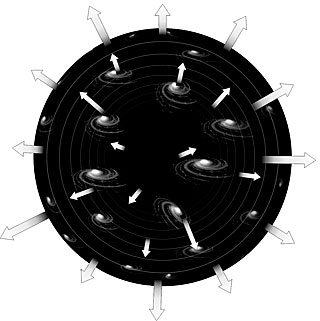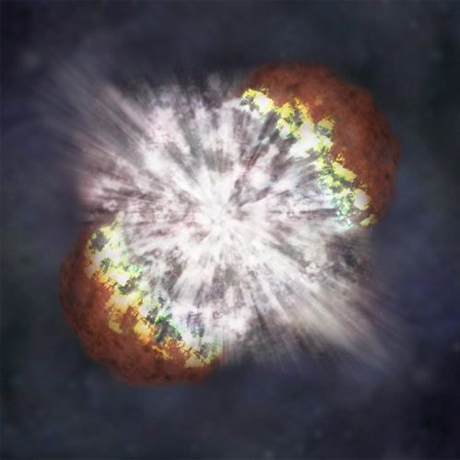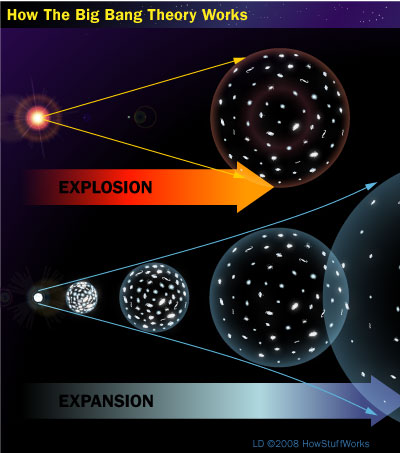






Become a fan on
Facebook
Folow author on:
facebook
twitter

Design by kakapo | copyright 2010 | Disclaimer
One of the most interesting questions considered by astrophysicists deals with the start of our universe. Indeed, there is a great deal of speculation on the subject, with different theories about how the universe began, and what may have existed before the universe came into being. Current theory is that the universe started from a big bang. As for what caused the big bang itself, and whether it makes sense to talk about time or what happened before the big bang, are still up for debate.
No one knows how the first space, time, and matter arose. And scientists are grappling with even deeper questions. If there was nothing to begin with, then where did the laws of nature come from? How did the universe "know" how to proceed? And why do the laws of nature produce a universe that is so hospitable to life? As difficult as these questions are, scientists are attempting to address them with bold new ideas - and new experiments to test those ideas.
How, what, when, why?




Sometimes it is easier to watch:
Perhaps the most unsettling and far-reaching prediction of string theory - and also of the inflationary universe model - is that the universe we live in is probably not unique. The inflationary model predicts that Big Bangs are continually taking place in other regions of space - and string theory suggests that these other mini-verses may be so different from our own that even the laws of nature and the number of dimensions of space may be different.
Lets say that universe started with Big Bang. Logically, there are three possibilities for the cause of the big bang:
1. something caused it to begin;
2. nothing caused it but it began anyway; or
3. the universe never began because it has always existed.
Assuming that prior to the Big Bang there was absolutely nothing I will start from there, and disregard question how the universe could be created from nothing? It is generally considered "proven" that the universe began about 14 billion years ago with the "big bang". In the big bang, all the matter, energy, space and time which we can observe were apparently created in an instant. Initially concentrated in a very small point, the universe expanded outwards rapidly with enormous energy.
Upper and lower picture represent the Big Bang
This was not like an explosion into empty space, but expansion of space itself. You can assume it like: extremly large baloo has grown out of tiny dot which exploded 14 billion years ago.
In the first fractions of a second, when current laws of physics did not apply, particles began to form out of the enormous energy - first small particles like quarks, gluons and leptons, later the more familiar protons, neutrons and electrons. The four fundamental forces or interactions (gravity, electromagnetism, the strong nuclear force and the weak nuclear force) developed gradually, because scientists believe that these forces are actually caused by an exchange of very small particles (bosons). At this stage the universe was so small that there was no space for more than minor irregularities, which was important for the later structure of the universe.
As the age of the universe moved beyond seconds to minutes, and it grew in size to about 1015 kilometres across, nuclear fusion formed the first of the nuclei we know about today - Hydrogen and Helium - in proportions that proved necessary for the universe as we know it to form. The universe was still incredibly hot. After several hundred thousand years, conditions had stabilised enough for the first atoms to form; after several hundred million years, the first stars, and later the first galaxies, began to form by gravitational attraction. Supernova stars created many of the heavier elements out of the lighter elements, and then exploded them out into space, making them available for planets which later formed, thus allowing the complexity of chemistry on earth necessary for life.
Lower picture simplifies expansion of the universe
The universe is still expanding today, and scientists are able to (a) extrapolate backwards and describe the early moments of the big bang mathematically, (b) predict outcomes of their theory which can be verified by observation of the universe, and (c) show mathematically that the alternative theories have significant flaws. Thus it has been demonstrated that the big bang origin is almost certain. Big bang theory is most common for describing the "origin of space", and is accepted among the scientists.
On the other hand, religions claim different - they claim that the universe was created by God (or some other supernatural being, but lets simplify it just with term "God"). So, people argue that if God can exist without an explanation, then why can't the universe?
God's existence then wouldn't explain anything. But if God exists and is timeless, and the universe clearly isn't, then his existence may explain everything better, even if it doesn't provide a scientific explanation. And, most important, every monoteistic religion says this: God created everything. Period. And everything is explained.
Each view has its supporters, but none can be proven or disproven. Each of us can decide. I believe it was not God or any other superbeing, and I think that universe really developted since Big Bang, and also I think that before the Big Bang there was nothing, and that there are so called parallel universes. It means that I support scientists, but I can not prove it. I just believe in this theory.




